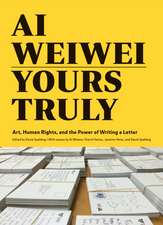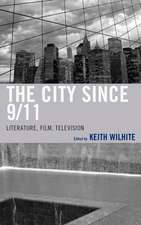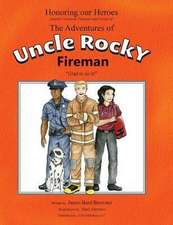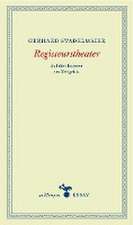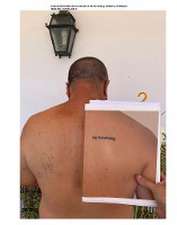Conversations
Autor Ai Weiweien Limba Engleză Paperback – 15 apr 2021
These wide-ranging conversations flow between topics such as his relationship with China, the meaning of citizenship, moving his studio to Lesbos to be on the front lines of the migrant crisis, how to make art, and technology as a tool for freedom or oppression. Ai opens up about his relationship to his father as a poet and as a dissident forced into hard labor in a small village after the Cultural Revolution. He conjures up scenes from his long relationship with New York: dropping out of Parsons because he couldn't afford tuition, making portraits in Washington Square Park as an undocumented immigrant in the 1980s, taking photos for the New York Times at demonstrations in Tompkins Square Park, and returning to set up the Good Fences Make Good Neighbors project across the city.
| Toate formatele și edițiile | Preț | Express |
|---|---|---|
| Paperback (1) | 103.91 lei 6-8 săpt. | +23.42 lei 6-12 zile |
| Columbia University Press – 15 apr 2021 | 103.91 lei 6-8 săpt. | +23.42 lei 6-12 zile |
| Hardback (1) | 462.41 lei 6-8 săpt. | |
| Columbia University Press – 15 apr 2021 | 462.41 lei 6-8 săpt. |
Preț: 103.91 lei
Nou
19.88€ • 20.76$ • 16.46£
Carte tipărită la comandă
Livrare economică 04-18 aprilie
Livrare express 27 februarie-05 martie pentru 33.41 lei
Specificații
ISBN-10: 023119739X
Pagini: 224
Dimensiuni: 141 x 215 x 10 mm
Greutate: 0.2 kg
Editura: Columbia University Press
Notă biografică
Ai Weiwei is a Chinese artist and activist.
Descriere
Ai Weiwei is one of the world's most acclaimed artists and dissidents. This book presents him in conversation with theorists, critics, journalists, and curators about key moments in his life and career.
These wide-ranging conversations flow between topics such as his relationship with China, the meaning of citizenship, moving his studio to Lesbos to be on the front lines of the migrant crisis, how to make art, and technology as a tool for freedom or oppression. Ai opens up about his relationship to his father as a poet and as a dissident forced into hard labor in a small village after the Cultural Revolution. He conjures up scenes from his long relationship with New York: dropping out of Parsons because he couldn't afford tuition, making portraits in Washington Square Park as an undocumented immigrant in the 1980s, taking photos for the New York Times at demonstrations in Tompkins Square Park, and returning to set up the Good Fences Make Good Neighbors project across the city.
Cuprins
1. Conversation with Andrew Solomon
2. Conversation with Evan Osnos
3. Conversation with Tim Marlow
4. Conversation with Amale Andraos and Carol Becker
5. Conversation with Vivian Yee
6. Conversation with Nicholas Baume
Contributor Biographies

